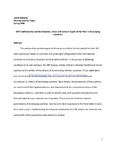IMF Conditionality and the Economic, Social and Cultural Rights of the Poor in Developing Countries

View/
Author
Ndoping, Judith
Subject
Washington and Lee University, Shepherd Poverty Program
International Covenant on Economic, Social, and Cultural Rights (1966)
International Monetary Fund
Economic assistance, Domestic
Urbanization -- Economic aspects
Metadata
Show full item recordDescription
Judith Ndoping is a member of the Class of 2006 of Washington and Lee University School of Law. Capstone; [FULL-TEXT FREELY AVAILABLE ONLINE] The policies that countries agree to follow as a condition for borrowing from the IMF have a profound impact on economic and social rights safeguarded by the International Covenant on Economic, Social and Cultural Rights (ICESCR). In the process of attaching conditions to its loan packages, the IMF imposes policies that are extremely harmful and deeply injurious to the welfare of the citizens of its borrowing member countries. These stabilization and structural adjustment programs impose enormous social costs and distributional unevenness on citizens of developing countries. Nevertheless, the proponents of these policies are convinced of their appropriateness, and empowered by the economic weakness of the developing countries, insist that, in order to achieve long term economic development and financial stability these measures are imperative. The end result is that the national governments of developing countries have become more responsive to the Fund rather than to their citizens and in implementing the measures imposed by the IMF, violate the economic and social rights of the people they were elected to protect. Judith Ndoping